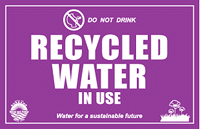
Burbank's Recycled Water Quality
The following is a description of the components present in recycled water:
Turbidity is a measurement of the clarity of water. Turbidity in water can be affected by any number of fine particles such as dust.
Total Dissolved Solids (TDS) are substances that exist as a solid when dry and are dissolved completely in water. Examples of TDS are: Chloride, Sulfate, Sodium, Calcium, and Magnesium. They are present in different types of salts and make up a portion of the TDS total count. Water that has a TDS of under 1000 (parts per million) is considered to be appropriate for agricultural use, and can be used for many industrial purposes.
Water hardness, expressed as calcium carbonate or CACO3 is highly present in Burbank's water, especially from local groundwater and imported water from the Colorado River. Hardness shows up on your dishes as water spots. The hardness of recycled water is about the same as the hardness of drinking water.
Potassium and nitrogen are present in recycled water in slightly higher levels than in potable water. Both potassium and nitrogen are valuable nutrients for plants. The use of recycled water often reduces the amount of supplemental fertilizer required.
Boron can be present in recycled water in small amounts. It is a byproduct that remains in water even after treatment when non-biodegradable detergents and soaps have been used. The use of environmentally friendly detergents and soaps will reduce the amount of boron present in recycled water.
Trace elements at low concentrations are essential for plant growth but at higher concentrations can exhibit plant toxicity. Burbank's recycled water does not have high concentrations of trace elements. Trace elements include the following: Arsenic, Beryllium, Cadmium, Chromium, Copper, Iron, Manganese, Nickel, Lead, Selenium, Zinc and Fluoride.
Fluoride is naturally high in Burbank's groundwater and since MWD started fluoridation in the later part of 2007, the fluoride levels are around 0.7 ppm. The treatment process neither adds nor reduces the fluoride levels.
Adjusted Sodium Adsorption Ratio (SAR) is a measurement of how sodium can be deposited from water to the soil. Normal precipitation and watering SAR levels in recycled water are considered to be acceptable for most agricultural use.
